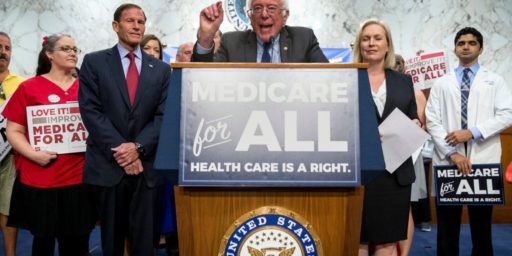Flash: Americans Want Free Health Care
I certainly wasn’t particularly surprised to hear that a large majority of Americans want universal health care:
A majority of Americans say the federal government should guarantee health insurance to every American, especially children, and are willing to pay higher taxes to do it, according to the latest New York Times/CBS News Poll.
While the war in Iraq remains the overarching issue in the early stages of the 2008 campaign, access to affordable health care is at the top of the public’s domestic agenda, ranked as far more important than immigration, cutting taxes or promoting traditional values. Only 24 percent said they were satisfied with President Bush’s handling of the issue, despite his recent initiatives, and 62 percent said the Democrats — not the Republicans — were more likely to improve the health care system.
Americans showed a striking willingness in the poll to make tradeoffs for a better health care system, including paying as much as $500 more in taxes a year and forgoing future tax cuts. But the same divisions that doomed the last attempt at creating universal health insurance, under the Clinton administration, are still apparent. Americans remain divided, largely along party lines, over whether the government should require everyone to participate in a national health care plan, and over whether the government would do a better job than the private insurance industry in providing coverage.
No word on whether Americans also favor free beer and ponies.
I know that most economists on the left side of the aisle continue to believe that the key problem with our healthcare system is “adverse selection” i.e. they believe that the main source of increasing is is that insurance administration costs are rising because of the lengths to which insurance companies are willing to go to avoid covering the highest-risk people. That’s why they favor going to a single-payer approach in which the government becomes the only insurer. Economists on the right side of the aisle tend to believe that the problem with our healthcare system is “moral hazard” i.e. that people with government- or employer-provided health insurance have little reason to be thrifty in their healthcare choices.
My own view is that the main problem with our healthcare system is that the supply of healthcare is quite inelastic (as the economists say), healthcare costs are rising without a commensurate rise in healthcare outputs due to that supply bottleneck and because bureacratization is rising at all levels—insurance companies, government, hospitals, etc.—and going to a single-payer system with universal coverage will result in small economies which, without other reforms, will quickly be overwhelmed by cost increases in the system for the other reasons I’ve mentioned above. I also see no fiscally responsible way that we can have both universal coverage and open borders.
At least Democratic presidential candidate John Edwards is honest about healthcare reform: universal coverage will cost more. I think he’s underestimating how much more it will cost, at least over time.
Spending more on healthcare while preserving the supply bottlenecks of our healthcare system means we’ll be spending less on lots of other things including manufacturing, technology, and other service industries— the things that employ most people in this country.
I believe that we’re only going to get one bite at the healthcare reform apple for a generation or so. I’ll be very disappointed if that bite doesn’t include measures that will control the secular systemic causes of cost increases in the system while expanding the demand through a single-payer system with universal coverage.






Dave,
Both you and the NYT are misleading readers. The NYT article clearly says:
“That level of concern helps explain the striking support for substantial change: Nearly two-thirds said the federal government should guarantee health insurance for all Americans. They were then asked, “What if that meant that the cost of your own health insurance would go up?†Forty-eight percent said they would still support it.”
If you agree that the relevant question is the last one, it is not true that a large majority support universal health care. If you don’t agree, please read any good econ text. Indeed there is no surprise about the NYT’s attempt to mislead its readers.
Check the other statistic in the article: the poll found that 8 in 10 Americans thought it was more important to have universal access to healthcare than to extend the Bush tax cuts (that, essentially, validates the Edwards plan). The conclusion that I drew from this was that a lot of people believe that universal coverage can be had without raising taxes on them, which I certainly don’t believe.
The “room full of money” theory of government is remarkably tenacious and, unfortunately, politicians don’t do much to dispel it (they frequently believe it themselves).
“and are willing for others to pay higher taxes to do it” is probably a more accurate statement.
The only question about the cost of providing universal health care is the one I mentioned. Your reference to tax cuts is also misleading because–thanks partly to the NYT– most people believe that others are the ones benefiting from the tax cuts.
Please don’t make reference to moral hazard in the current system: there can be no moral hazard in a system in which you pay a fix amount to cover the expenses that you decide. We don’t say that that there is a moral hazard problem when you pay a fix amount to eat all the pizza you want.
Mr. Schuler, I’d like to believe you’re not a jerk. Really, I would. This is supposed to be a civil blog, where (as JJ mentioned a few back) the posters set the tone.
But what are we supposed to think of someone who places basic health care for all Americans on a par with “free beer and ponies”?
Lost any kids to a tooth infection lately?
Since many Americans don’t pay for their health insurance how do we judge the response that they don’t mind the cost of their own insurance going up? They don’t pay for it so of course they don’t mind.
The solutions, like the problems, are many. Dealing with the “moral hazards”, lack of information, regulatory issues, bottlenecks, and administrative costs will require many different approaches.
We should find the market failures one by one and deal with them one by one. Doing a complete switch over to universal health care will be a mess.
What an odd post. Your title is just silly, because Americans don’t want or expect “free” healthcare. If you believe that a service you pay for with taxes is “free,” then your definition of “free” is different from most people’s.
Also, health care is not beer or ponies. Why would you say something like this? It makes you look so stupid.
Anderson,
Come on, it’s pretty transparent you’re calling someone a jerk by another method. What’s civil about that?
Schuler’s point is the public wants a lot of things it can’t afford. There are costs and trade offs.
Steven,
There are no Americans who don’t pay for their health insurance. Every American who has health insurance pays for it in one way or another. There is no such thing as free health insurance in this country or any other country; it doesn’t exist.
It’s hard for a lot of people to express themselves without resorting 2 name calling. I think the obvious point is that a lot of people are inclined to support things that are offered as ‘free’ without understanding the underlying costs and ramifications.
I think the obvious point is that a lot of people are inclined to support things that are offered as ‘free’ without understanding the underlying costs and ramifications.
If by “things” you mean national health care, then you’re wrong. Because nobody is offering or has offered or would ever offer free national health care. And most people understand that taxes equal money, and that if national health care is funded by taxes, that means it costs money, and that means it’s not free.
I did say MOST people understand this. That means there are some people who think that taxpayer-funded services are free.
Just because my health insurance is paid for doesn’t mean I’m the one who did the paying.
My sister-in-law is an American who doesn’t pay for her health insurance. She hasn’t put enough into the system to truly cover what she receives through Social Security, Medicaid and Medicare.
Don’t get me wrong, I’m very thankful that she receives it because she would be in a world of shit (she’s quite disabled).
The clinic downstairs is daily full of people who did not pay for their health insurance. They use it and abuse it, more so (in my opinion) because they don’t pay for it.
L
Kathy,
I think you misunderstand. Many Americans have their health insurance premium paid by their employer thus insulating them from what it costs. That hiding of the costs (like you say we all pay for it one way or another) distorts the market. Fixing that particular market failure is one of the problems needing to be addressed.
Again, Schuler’s point about the ponies and beer is one of the insatiable appetite of the public and the finite amount of money. Scarcity. Making a point by extreme example is pretty common, not stupid.
The term “free” is being used to describe a service that will be free to some. Even taxpayer finance health will be free to some of the users.
I don’t quite get all the polling on this. Do we now plan to run our country through public opinion polls or can we expect leadership and foresight?
sorry but you don’t know what you’re talking about – just like public education or universal preschool when people don’t directly pay for the service they view it as free.
Uhhhmmm what? I’m sorry, but that is simply not true.
The problem of moral hazard frequently has to do with effort levels. In insurance, the presence of insurance can reduce the level of effort put forward to avoid the bad outcome.
Kathy,
I’ve been trading quips and comments with Dave for several years now on health care and I can assure you that Dave is not operating under the premise you ascribe to him. My suggestion is you buy a new sarcasm meter as your current one appears broken. Same goes for you Anderson.
As for paying for health care, you’re only partly right. Sure all health care is paid for. But there is the very important question of who pays for it. Depending on how you do it you could set up some very perverse incentives.
For example, you have a plan where you pay in say, $150 a month (please note this is a hypothetical to illustrate a point, if you get pissy about how much health care plans actually cost I’ll delete your reply summarily). So annually you spend about $1,800. Suppose further you have a $200 deductible. And lets supose you are unfortunate to incur $200,000 in medical expenses. Did you pay for all of those expenses? No. Everybody else who participates in your plan and didn’t get sick picked up the slack.
This indicates that you have a sophmoric understanding of the issue. Sure taxes equal money, but many people don’t understand that their current employer benefits are actually part of their pay.
Further, this creates, as Steve Plunk has noted, a layer of insulation between people and much of their health care costs. As such we tend to get health insulation vs. actual insurance. Insulation covers all sorts of minor expenditures from glasses, to routine check-ups/procedures. Insurance by contrats covers large, un-expected expenditures. Real health insurance would leave routine visits, procedures and other high probability low cost aspects of health care to individual while covering large and improbable expenditures such as heart attack, cancer and so forth.
I tend to disagree with Dave in that I don’t think this is a situation where it has to be, adverse selection or moral hazard or the supply issues he talks about. I think it can be all three at once along with other bad policies such as the tax exempt statust of employer provided health care. My personal choice to address the problem would be to,
1. Require by law catastrophic health insurance.
2. Removal of the tax exempt status of health insurance provided by employers.
2.b. Or Make individual health insurance expenditures tax exempt.
3. Have the government send a check to each household/family/individual so that they could by the insurance required by 1.
Would it result in free beer and ponies? No, but I think it could slow down the unstable growth rate in health care expenditures. Most other solutions are just re-arranging the deck chairs on the Titanic, IMO.
An important aside to the survey question about how much people were willing to pay for “free” national health care for everyone. The survey asked how many would be willing to pay “up to $500” to find the a slim majority would approve. Since this works out to about $40 a month, it does not begin to be a realistic number, if as one might suppose, this would be some sort of payroll tax. One thing all those who keep telling us the government should provide “free” health care (or college education or “more” mass transit, parks, cops, etc) is how much it will cost. My current premiums (the part not covered by my employer) are upwards of $250 a month. This is without small but meaningful deductibles (so far this year, out of pocket approaches $500). Do I imagine my cost of providing health care to everyone will somehow cost me less than this? Only if I also imagine the Chicago Cubs winning the World Series against the Chicago White Sox.
Quote of the week–for both its humor and poignancy
Medicare covers every single American over 65 years of age. They love it. It provides the best medicine in the world.
So just have Medicare cover every one regardless of age and the problem is solved.
Instead of insurance company premium which eat up over 20 cents on the dollar in bureaucracy, we would have taxes which utilize 98 cents of every dollar delivering real health care.
The problem with medicine in America is really not a ‘big’ problem except in the minds of those who try to fix it with Rube Goldberg type plans. The simple solution is the best. Just provide Medicare for all. It really is that simple.
How come none of you are pointing out the fact that the United States already spends more on health care PER PERSON than any country in the world?
I don’t care if you’re on the left or right….this is a fact. Throwing more money into health care will NOT solve the problem because money is the problem.